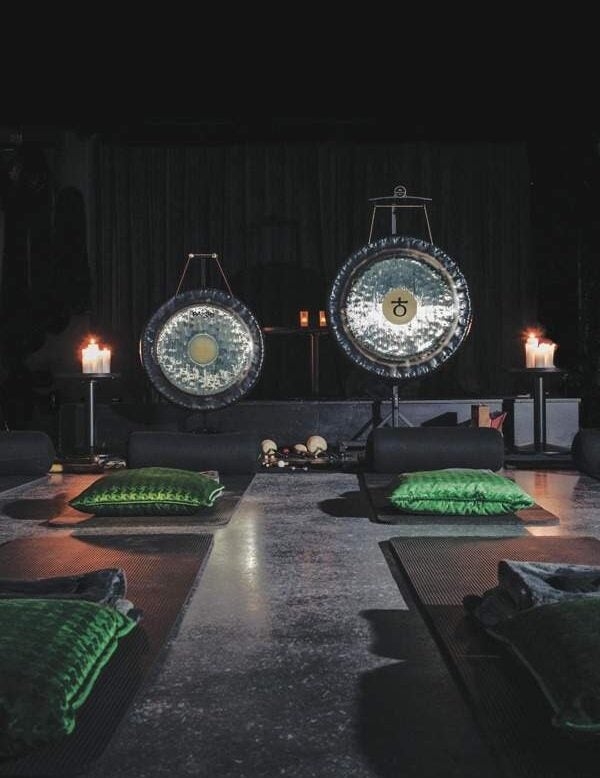
As sound healing grows in popularity, more and more people are turning to gong baths to relieve stress, writes Jo Foley
If the planets made music, it might well sound like the noise emanating from the basement of a central London hotel – light and singing one minute, gradually getting deeper and deeper before whirling off in a clash of cymbals somewhere in the far regions of the constellation, before returning to the sonorous rumbling of distant thunder.
That’s what a gong bath sounds like – although it may never sound the same again, depending on your mood, your needs and what your gong guide (teacher/therapist) is using. (This could be gongs, singing bowls, drums, bells, tuning forks or a selection thereof.)
All you have to do is take your shoes off, lie down with a couple of pillows or bolsters, one for your head and one underneath your knees to remove any strain on the back, a blanket to cover you and a mask to cover your eyes. You may indeed be taking a gong bath, but no water is involved, other than the gallons you’ll want to drink after your session.
As someone who longs for silence, I have long been a devotee of sound healing, but until recently gong baths have been a rare therapy in London. Now, though, they are springing up in yoga studios, gyms and hotels all over the place.
I remember the first one I had, lying on a massage bed with a huge bronze gong at my head, another at my feet, and a selection of Tibetan singing bowls placed on three of my chakras! Oddly enough the noise was gentle, and even odder, the bowls moved as my ‘vibrational energy’ was unblocked.
A couple of years later, a Chinese therapist at a Thai spa did something with tuning forks and crystal bowls that had such an effect on my energy levels that I took to my bed for two days. Rarely is sound therapy that strong, but the whole purpose of a gong bath is to aid relaxation and refocus energy.
Our normal waking brainwave state is beta, but in order to relax, sleep and restore our energies we need to get to the theta and delta waves, which are the slowest and deepest levels.
And that is where sound steps in and, with the beating of a gong, the singing of a bowl or even the chanting of a choir, helps us get there. It is this aid to relaxation that has brought about the popularity of gong baths, for if they do nothing else they are an almost instant aid to meditation.
While you’re lying in the dark listening to the sounds emanating from them, you’re not concentrating on anything else and your mind is in mega-relaxed. So much so that many nod off to sleep.
With a different instrument, the sound returns rumbling and rich, which seems to wrap itself around you like a sonic blanket.
Back to life
And then an hour has passed and it’s over. All that depth, called to a halt by the gentle strike of a tuning fork. We are instructed to get up slowly, take time before we return to meet the outdoor world, and not to rush through the rest of the evening.
All fine unless you decide to hit Tesco for supper provisions, which I did, making myself feel increasingly strange by the time I got home. Supper was ignored and I went straight to bed, slept like a baby and woke full of energy the following morning.
Perhaps that’s why the over-stressed, over-stretched and over-tired have taken to gong baths – a place to switch off, a way to a decent night’s sleep and a means of refocusing energy.
And while there is little scientific evidence for the efficacy of sound healing, there is a great deal of anecdotal, where the therapy is believed to decrease anxiety, help boost the immune system and help reduce anger, depression and fatigue.
And now that it’s widely accepted that many illnesses are stress-related, we have witnessed the growth in interest of yoga, meditation, mindfulness and now gong baths.






